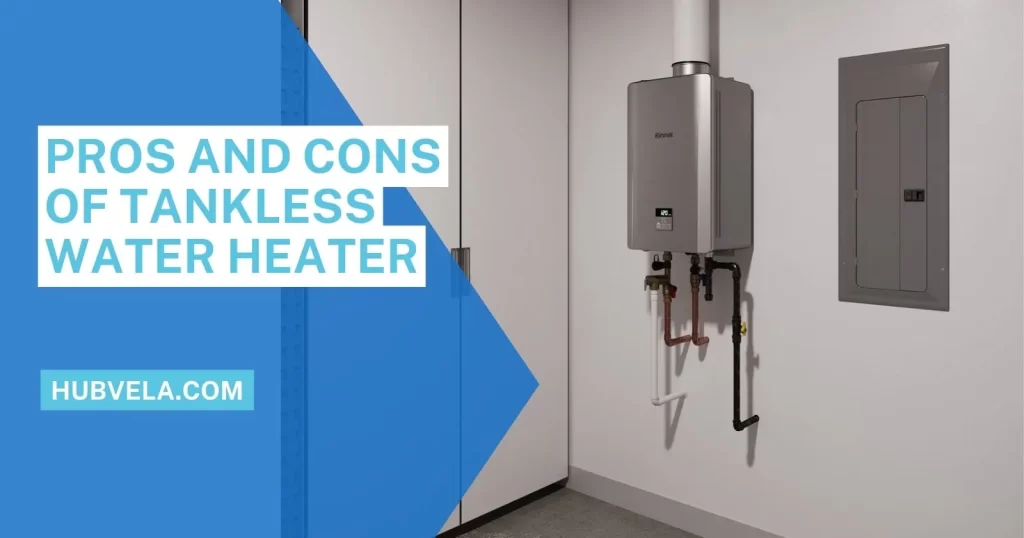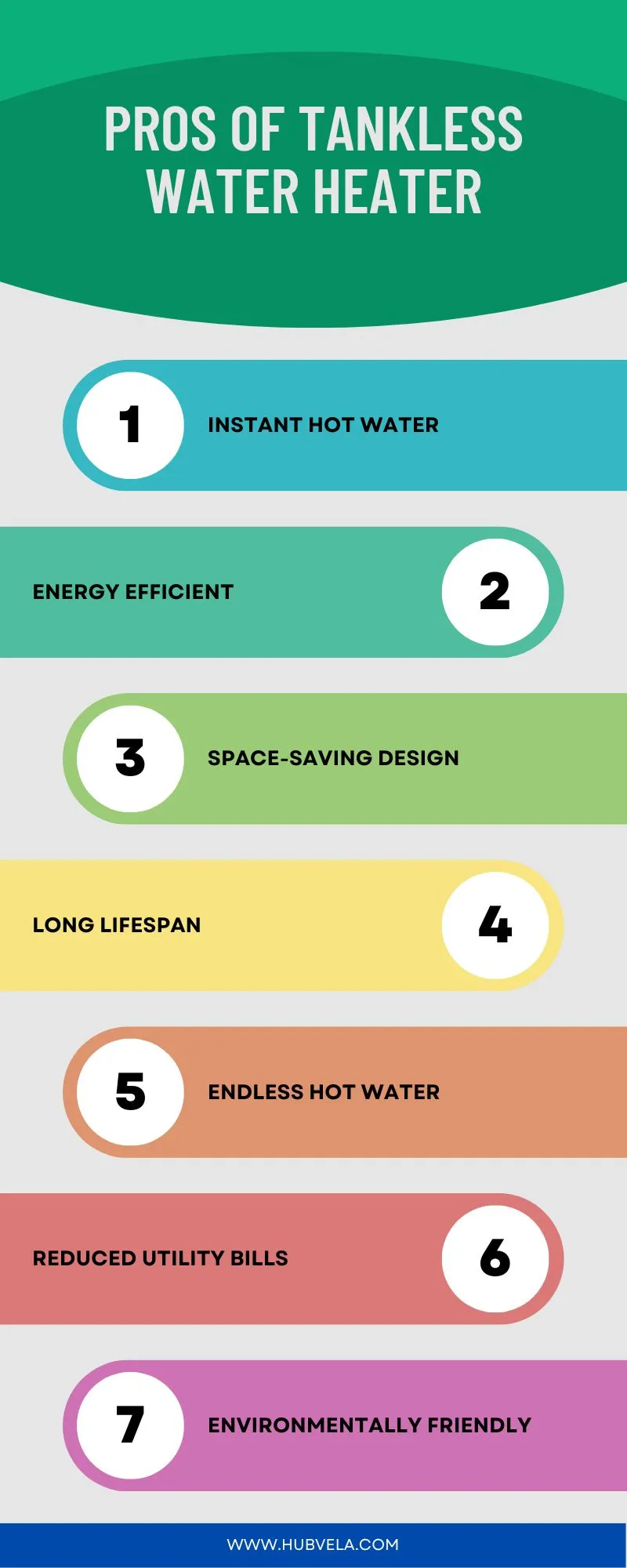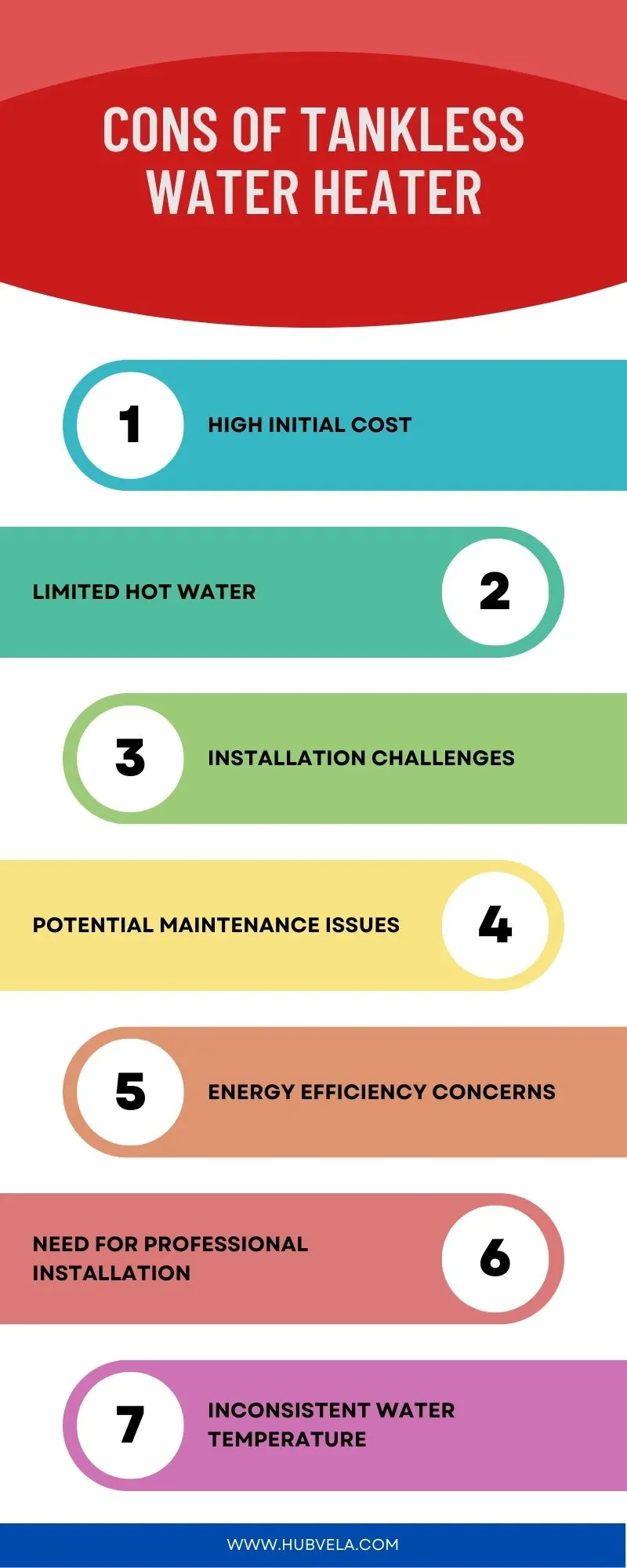If you’re concerned about never running out of hot water with a tankless water heater, rest assured that it provides endless hot water on demand.
However, before you make a decision, consider the potential trade-offs. From energy efficiency to installation challenges, there are various aspects to weigh when opting for a tankless water heater.
While the convenience of instant hot water is appealing, there are some drawbacks that might give you pause.

--Advertisement--
Pros of Tankless Water Heater
Tankless water heaters have become increasingly popular in recent years due to their numerous benefits over traditional tank-style water heaters. We will explore the pros of tankless water heaters and why they may be a better option for your home.

1. Instant Hot Water
Enjoy immediate access to hot water with a tankless water heater, providing you with on-demand comfort and convenience. Say goodbye to waiting for the water to heat up in a tank; instead, revel in the luxury of hot water at your fingertips instantaneously.
Whether you’re starting your day with a refreshing shower or need hot water for cooking or cleaning, a tankless water heater ensures you have hot water whenever you need it. No more rationing hot water or worrying about running out mid-shower.
With a tankless water heater, you can enjoy the freedom of continuous hot water flow, enhancing your overall daily experience and making tasks that require hot water more efficient and enjoyable.
2. Energy Efficient
Increase your home’s energy efficiency by switching to a tankless water heater. This upgrade will save you money on utility bills while reducing energy consumption.
Unlike traditional water heaters that constantly heat and reheat water in a tank, tankless water heaters heat water on demand. This means they only consume energy when hot water is needed, eliminating standby energy losses.
Tankless water heaters are more energy-efficient. Some models boast over 90% thermal efficiency compared to tank heaters, which are typically around 60% efficient.
By making the switch, you can lower your energy usage, reduce your carbon footprint, and enjoy the benefits of hot water without the wasteful energy consumption associated with traditional water heaters.
3. Space-Saving Design
One notable advantage of a tankless water heater is its compact and space-saving design, perfect for homes with limited room for a traditional water tank.
Unlike bulky conventional water heaters that take up significant floor space, tankless water heaters are mounted on walls, freeing up valuable square footage in your home.
Their small size allows for flexible installation in tight spots like closets or under cabinets, making them ideal for apartments, condos, or smaller houses.
With their sleek and modern look, tankless water heaters blend seamlessly into any living space without dominating the room.
This space-efficient design not only provides convenience but also gives you more options when it comes to optimizing your home layout.
4. Long Lifespan
Boasting a long lifespan, tankless water heaters offer a durable and reliable solution for your hot water needs. Unlike traditional water heaters that typically last around 10-15 years, tankless water heaters have a lifespan of 20 years or more when properly maintained.
This extended lifespan not only provides you with consistent hot water for a longer period but also reduces the frequency of replacements, saving you money in the long run.
With proper care and regular maintenance, you can enjoy the benefits of your tankless water heater for two decades or more, ensuring a reliable source of hot water for your household without the hassle of premature breakdowns or replacements.
5. Endless Hot Water
With a tankless water heater, you can enjoy a continuous supply of hot water on demand, ensuring you never run out during your showers or chores.
Unlike traditional water heaters that store a limited amount of hot water, tankless heaters heat water as it flows through the unit, providing you with endless hot water whenever you need it.
This means no more cold showers or waiting for the tank to refill with hot water. Whether you have a large family or enjoy long showers, a tankless water heater guarantees a steady stream of hot water without the worry of depleting your supply.
Say goodbye to scheduling shower times or rationing hot water – with a tankless water heater, you’ll have hot water whenever you need it.
6. Reduced Utility Bills
Transitioning from the endless hot water benefits, you’ll appreciate the significant advantage of reduced utility bills with a tankless water heater.
Traditional water heaters constantly heat and reheat water in a tank, even when not in use, leading to energy wastage.
In contrast, tankless water heaters heat water on demand, eliminating standby energy losses. This efficient heating method can result in lower energy consumption and subsequently reduced utility bills.
With a tankless system, you only heat water when needed, avoiding the costs associated with constantly maintaining a large tank of hot water.
7. Environmentally Friendly
Choosing a tankless water heater can positively impact the environment due to its energy-efficient operation and reduced carbon footprint.
Tankless water heaters only heat water when needed, eliminating the standby energy losses of traditional water heaters that continuously heat a tank of water.
By heating water on demand, tankless heaters consume less energy, leading to lower greenhouse gas emissions.
Tankless water heaters have a longer lifespan than traditional tank heaters, reducing the number of units that end up in landfills.
Their smaller size also saves space and can be installed closer to the point of use, reducing heat loss in the pipes.
Cons of Tankless Water Heater
Tankless water heaters, known for their on-demand efficiency and space-saving design, offer numerous benefits. However, like any technology, they also present certain drawbacks.
We will explore the cons of tankless water heaters, highlighting factors such as higher initial costs, the potential for limited hot water output, and the potential for increased energy consumption in certain scenarios.

1. High Initial Cost
Considering the significant investment required, the high initial cost of a tankless water heater may deter some homeowners from making the switch.
The upfront price of purchasing and installing a tankless water heater is notably higher than that of a traditional water heater. While the long-term energy savings can offset this initial expense, it may still be a barrier for those on a tight budget.
If your home requires extensive retrofitting or upgrades to accommodate a tankless system, the overall cost can increase further.
It’s important to weigh the initial investment against the potential savings over time to determine if a tankless water heater is the right choice for your household.
2. Limited Hot Water
If you opt for a tankless water heater, you may encounter the drawback of limited hot water availability. Unlike traditional water heaters that store hot water in a tank ready for use, tankless water heaters heat water on demand.
While this can be energy-efficient and space-saving, it also means that there’s a limit to how much hot water can be produced at once.
If you have a high demand for hot water, such as during simultaneous showers or when running multiple appliances, a tankless water heater may struggle to keep up, leading to lukewarm water or fluctuations in temperature.
It’s essential to consider your household’s hot water usage patterns when deciding if a tankless water heater is right for you.
3. Installation Challenges
If you’re thinking about installing a tankless water heater, be prepared for potential challenges in the installation process. Unlike traditional water heaters, tankless models often require a larger gas line to accommodate the higher flow rate.
This means you may need to upgrade your existing gas line, which can add to the overall installation cost.
Installing a tankless water heater may require changes to your home’s electrical system if you’re switching from a gas to an electric model or if your current electrical system isn’t equipped to handle the increased energy demands.
Ensuring proper venting for gas-powered tankless water heaters is crucial to prevent any safety hazards, so professional installation is highly recommended to navigate these challenges effectively.
4. Potential Maintenance Issues
Prepare to address potential maintenance issues when opting for a tankless water heater. They can impact the performance and longevity of the system.
Over time, mineral deposits can build up inside the unit, leading to decreased efficiency and potentially causing damage. Flushing the system regularly is necessary to prevent these issues.
The heat exchanger in a tankless water heater can be susceptible to corrosion if not properly maintained. Checking for leaks, ensuring proper ventilation, and monitoring water pressure are essential tasks to avoid potential breakdowns.
Ignoring maintenance can result in reduced hot water production, increased energy consumption, and even system failure. Stay proactive in caring for your tankless water heater to maximize its efficiency and lifespan.
5. Energy Efficiency Concerns
Considering energy efficiency concerns with tankless water heaters, it’s important to be aware of how they can impact your overall utility costs.
While tankless water heaters are more energy-efficient than traditional tank water heaters, they require a significant amount of energy during operation, especially when multiple hot water sources are being used simultaneously.
This increased energy consumption can lead to higher electricity or gas bills compared to a tank water heater, potentially offsetting the initial cost savings.
Standby energy losses are eliminated with tankless water heaters, but the overall energy savings may not always justify the higher upfront costs.
It’s essential to weigh the energy efficiency benefits against the potential increase in utility expenses before deciding on a tankless water heater.
6. Need for Professional Installation
To ensure proper functioning and safety, professional installation is crucial when it comes to tankless water heaters.
While some may attempt a DIY installation to save money, the complexity of connecting the unit to gas lines, water lines, and electrical systems can lead to costly mistakes if not done correctly.
Improper installation can result in gas leaks, water damage, or even electrical hazards, putting your home and family at risk. Most manufacturers require professional installation to keep the warranty valid.
By hiring a certified professional, you can ensure that your tankless water heater is installed correctly and efficiently, maximizing its lifespan and performance while minimizing the potential for dangerous errors.
7. Inconsistent Water Temperature
When it comes to tankless water heaters, one common drawback that homeowners may encounter is inconsistent water temperature.
This issue arises because tankless water heaters heat water on demand as it flows through the unit. As a result, if multiple sources are using hot water simultaneously, the heater may struggle to maintain a consistent temperature.
For instance, you might notice fluctuations in water temperature when running both the shower and the dishwasher at the same time.
To mitigate this problem, you may need to invest in a unit with a higher flow rate or consider installing multiple units to ensure adequate hot water supply throughout your home.
Conclusion on Pros and Cons of Tankless Water Heater
Overall, tankless water heaters offer many benefits such as energy efficiency, unlimited hot water supply, and space-saving design. However, they also come with drawbacks like higher upfront costs and the potential for inconsistent water temperature
It’s important to weigh these pros and cons carefully to determine if a tankless water heater is the right choice for your home.


